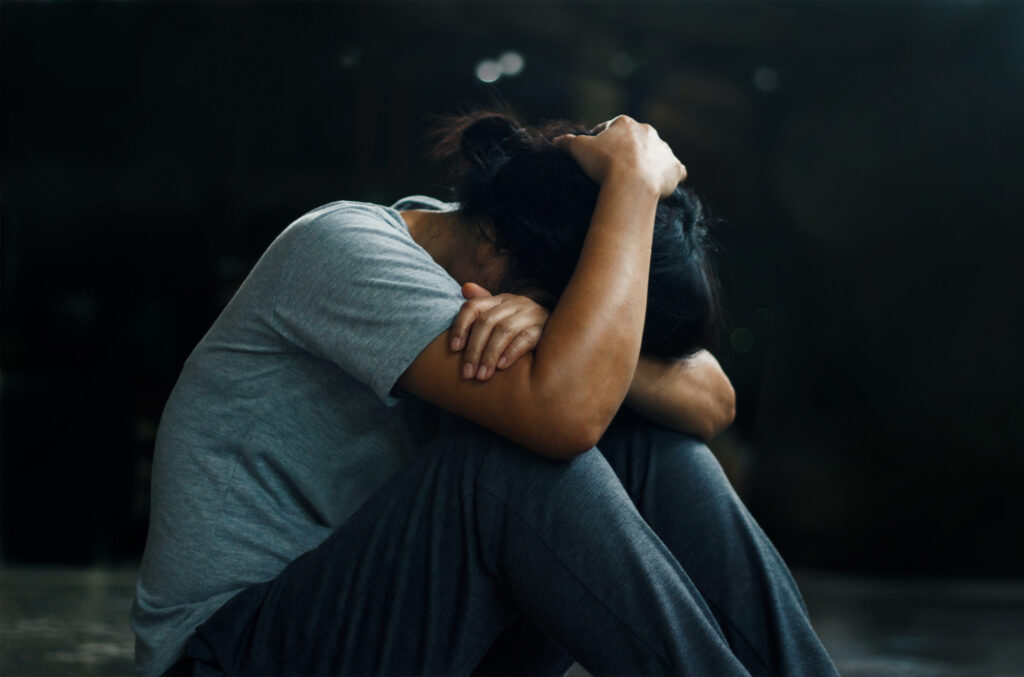The devastating mental illness known as Post-Traumatic Stress Disorder (PTSD) can strike anyone who has been through or seen a terrible event.
It’s important to recognize if you may be experiencing symptoms of PTSD so that you can get the support and treatment you need. If you’re asking yourself, “Do I have PTSD?” we want to give you a quick rundown on PTSD and walk you through a self-assessment quiz to see if you might be dealing with any symptoms of this condition.

What is PTSD, exactly?
PTSD can occur as a result of experiencing a traumatic event, such as military combat, natural disasters, serious accidents, terrorist incidents, or violent personal assaults like rape. The disorder can lead to intense and disturbing thoughts and feelings that continue long after the traumatic event has ended. People who have PTSD might experience flashbacks or nightmares, and they may also feel sadness, fear, or anger. They might also feel disconnected or distant from others.
What are the Symptoms of PTSD?
PTSD symptoms can be grouped into four main categories: intrusive memories, avoidance, negative changes in thinking and mood, and changes in physical and emotional reactions. These symptoms can change over time and differ from person to person.
Intrusive Memories
- Recurrent, unwanted distressing memories of the traumatic event
- Reliving the traumatic event as if it were happening again (flashbacks)
- Upsetting dreams or nightmares about the traumatic event
- Severe emotional distress or physical reactions to something that reminds you of the traumatic event
Avoidance
- Trying to avoid thinking or talking about the traumatic event
- Avoiding places, activities, or people that remind you of the traumatic event
Negative Changes in Thinking and Mood
- Negative thoughts about yourself, other people, or the world
- Hopelessness about the future
- Memory problems, including not remembering important aspects of the traumatic event
- Difficulty maintaining close relationships
- Feeling detached from family and friends
- Lack of interest in activities you once enjoyed
- Difficulty experiencing positive emotions
- Feeling emotionally numb
Changes in Physical and Emotional Reactions
- Being easily startled or frightened
- Always being on guard for danger
- Self-destructive behavior, such as drinking too much or driving too fast
- Trouble sleeping
- Trouble concentrating
- Irritability, angry outbursts, or aggressive behavior
- Overwhelming guilt or shame
Take a PTSD Self-Assessment Quiz
Here are some questions that we call a “Do I have PTSD?” quiz. This isn’t a “Do I have PTSD” test and isn’t meant to diagnose anything, but it can give you some perspective on your mental health and maybe even encourage you to reach out to a professional if you think it’s necessary.
PTSD Quiz Questions
- Have you experienced a traumatic event that caused you intense fear, helplessness, or horror? Think about any events in your life that were highly distressing or traumatic. These events can be personal or something you witnessed.
- Are you experiencing any recurring memories or dreams of the traumatic event? Think about whether you often think or dream about the event in a way that makes you feel bad.
- Do you try to avoid thoughts, feelings, or conversations about the traumatic event? Check to see if you are consciously avoiding things that make you think of the trauma.
- Do you avoid certain places or activities because they remind you of the traumatic event? You might want to think about whether you avoid certain places, people, or things that remind you of the trauma.
- Do you have trouble remembering important aspects of the traumatic event? It’s a worrying sign if you can’t remember important information about what happened during the traumatic event.
- Do you feel detached from others or have difficulty maintaining close relationships? Think about your relationships with other people and whether you feel alone or cut off from family and friends.
- Do you have persistent negative thoughts about yourself or the world? Think about whether you often feel bad about yourself, other people, or life in general.
- Do you have trouble experiencing positive emotions or feel emotionally numb? Assess if you find it difficult to feel happiness, joy, or other positive emotions.
- Do you startle easily, feel on edge, or have difficulty sleeping? Think about how you handle loud noises or sudden moves and how well you can relax and sleep.
- Do you engage in self-destructive behaviors such as substance abuse or reckless driving? Think about whether you’ve picked up any bad habits as a way to deal with your emotions.
What to Do Next
You might be showing signs of PTSD if you said yes to these “how do I know if I have PTSD?” questions. It’s important to talk to a medical worker to get a full diagnosis and the right treatment. PTSD can be treated, and the first step to getting better is to get help.

How to Get Help and Treatment for PTSD
PTSD can be treated in several ways, such as through therapy, medicine, and support groups. Cognitive-behavioral treatment (CBT) is very good at treating PTSD because it helps people change the way they think about negative things and slowly face up to traumatic memories and situations. Medications, like antidepressants, can also help you deal with your problems.
To get help and improve your health, you must be able to recognize the symptoms of post-traumatic stress disorder (PTSD) and understand how it affects your life. You can begin to evaluate your symptoms by taking this self-assessment quiz. Remember, seeking professional help is crucial for diagnosis and treatment. If you think you might have PTSD, reach out to a mental health professional who can guide you on the path to recovery.
Help is available at The Grove Recovery for those dealing with post-traumatic stress disorder (PTSD) or those close to them. Our group of skilled doctors is here to help you and give you the care you need. If you’d like to learn more about your results and speak to a clinician today, call us at (657) 221-1196. You are not alone, and help is available.
Call us today and one of our specialist can help you get stated and give you the information you need to begin your recovery.
FAQs About PTSD
What are the risk factors for developing PTSD?
Intense or persistent trauma, a history of mental illness, a lack of a strong support network, coping with post-event stressors like bereavement, and employment in occupations that expose one to traumatizing situations—such as those in the military or emergency services—are risk factors that may have you asking, “Do I have PTSD?”
Can PTSD develop immediately after a traumatic event?
PTSD can develop immediately after a traumatic event, but it can also appear weeks, months, or even years later. Some people experience delayed-onset PTSD, where symptoms do not appear until long after the traumatic event.
How is PTSD diagnosed?
A mental health specialist will evaluate your symptoms and how they affect your life to diagnose PTSD, and often there may be a dual diagnosis. This usually entails a detailed psychological assessment as well as a conversation about your past trauma experiences and present symptoms.
What treatments are available for PTSD?
Common treatments for PTSD include psychotherapy (such as cognitive-behavioral therapy and exposure therapy), medications (such as antidepressants and anti-anxiety medications), and support groups. Treatment plans are frequently customized to meet the needs of the client and may incorporate more than one of these strategies.
Is PTSD curable?
While there is no cure for PTSD, many people can manage their symptoms effectively with the right treatment and support. With the right therapy, some people may see a noticeable improvement in their symptoms or perhaps a complete remission.
Are there any self-help strategies for managing PTSD symptoms?
Self-help strategies for managing PTSD symptoms include practicing relaxation techniques (such as deep breathing and mindfulness meditation), maintaining a regular exercise routine, establishing a consistent sleep schedule, and engaging in activities that promote relaxation and well-being. For people with PTSD, joining a support group can also be very helpful.
What should I do if I think I have PTSD but am not ready to seek professional help?
Talking to a trusted friend or family member about your experiences could help if you think you might have PTSD but aren’t ready to see a doctor. You can also learn about PTSD from reliable sites and look into ways to help yourself. Remember that getting help from a professional is an important step toward getting better when you are ready.




